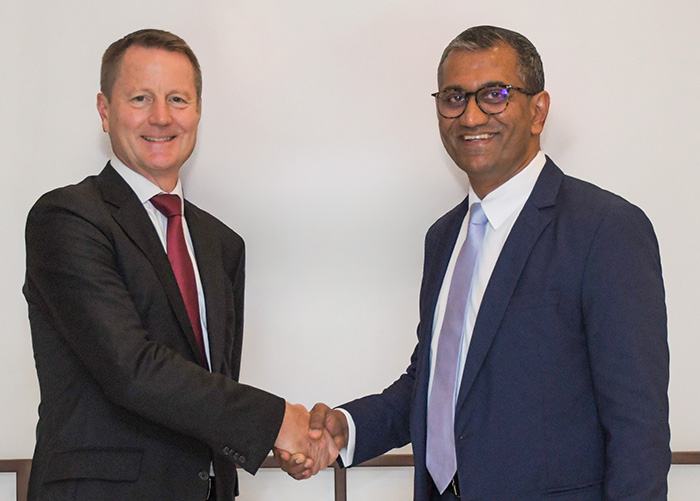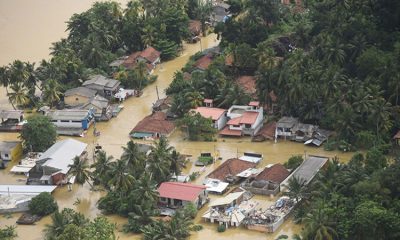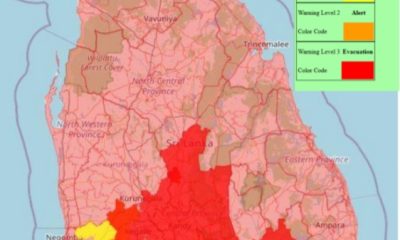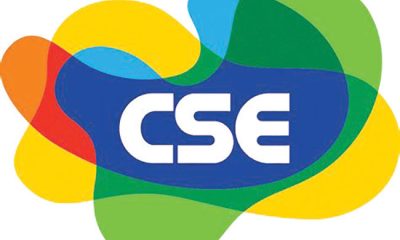Business
Share market driven by retail investors as IMF third tranche hopes rise

By Hiran H.Senewiratne
The stock market yesterday was driven by retail investors due to speculation that IMF approval would materialize this week and that Sri Lanka will receive the third tranche of the IMF EFF. This is a great inducement for foreign and local investors to invest in the stock market, analysts said.
Due to these developments the market was bullish and both indices moved upwards. The All Share Price Index went up by 87.11 points while the S and P SL20 rose by 35.2 points. Turnover stood at Rs1.6 billion with one crossing. The crossing was reported in JKH, which crossed 1.25 million shares to the tune of Rs 253 million; its shares traded at Rs 204.
In the retail market top seven companies that mainly contributed to the turnover were; Hayleys Rs 184.1 million (1.8 million shares traded), JKH Rs 180 million (880,000 shares traded), HNB Rs 89.4 million (434,000 shares traded), Commercial Bank Rs 83.2 million (765,000 shares traded), Sampath Bank Rs 60 million (743,000 shares traded), NTB Rs 59.6 million (255,000 shares traded) and Royal Ceramic Rs 45.3 million (1.2 million shares traded). During the day 63.3 million share volumes changed hands in 12000 transactions.
It is said that JKH became the main contributor to the market, while banking sector counters were active, especially HNB, Commercial Bank, Sampath Bank and NTB.
The CSE announced that the settlement cycle for all equity transactions on the CSE will be shortened to T+2 with effect from yesterday. Market turnover was Rs 63 million.
Fitch Ratings assigned Commercial Bank’s proposed debentures of up to Rs 20 billion, a national long-term rating of ‘BBB+(lka)’, a rating two notches below the bank’s National Long-Term Rating anchor.
“This reflects Fitch’s baseline notching for loss severity for this type of debt and expectation of poor recoveries. There is no additional notching for non-performance risk, as the notes do not incorporate going-concern loss absorption features, Fitch said.
Yesterday the rupee was quoted at Rs 302.80/95 to the US dollar in the first half-hour of trading, while bond yields were steady and stocks opened 0.55 percent higher, dealers said. The rupee closed at Rs 302.70/80 to the greenback on Friday.
In the secondary market, yields were stable in somewhat dull trade, dealers said. A bond maturing on 15.12.2026 was quoted stable at 9.95/10.05 percent. A bond maturing on 15.09.2027 was quoted at 10.45/65 percent up from 10.45/55 percent. A bond maturing on 01.07.2028 was quoted stable at 11.00/10 percent. A bond maturing on 15.05.2030 was quoted at 11.75/85 percent up from 11.75/90 percent.
Business
“Enchanted Wonders” Christmas Tree Lighting

One Galle Face, the premier retail destination in Sri Lanka, officially unveiled Colombo’s most iconic Christmas experience with its annual Tree Lighting Ceremony held recently. This year, the mall celebrates the season under the enchanting theme “Enchanted Wonders,” creating a magical and visually captivating festive atmosphere for all visitors. The centrepiece of the celebration is Sri Lanka’s tallest indoor Christmas tree, standing at an impressive 76 feet, marking a standout moment in the country’s holiday calendar.
The ceremony transformed the mall into a festive setting filled with striking illumination, seasonal artistry, and immersive installations. The official lighting moment set the tone for the holiday season at One Galle Face, inviting families, shoppers, and visitors to experience a new era of experiential retail throughout the month. Guests can look forward to a line-up of interactive activities, family-friendly engagements, seasonal showcases, and exclusive festive privileges curated for One Galle Face Rewards Members.
The One Galle Face festive celebrations are powered by Sampath Bank as its Strategic Partner and YES FM as the Official Radio Partner. The memorable evening brought together a distinguished community of influential partners, leaders, and creative professionals from various domains, including senior leadership of One Galle Face, Shangri-La Hotel management, heads of leading international and local brands, Sampath Bank management and employees, MBC Network leadership, representatives from One Galle Face Tower and The Residences at One Galle Face, as well as popular personalities and local celebrities.
One Galle Face General Manager Sachin Dhanawade commented, “We are excited to officially launch the One Galle Face Christmas holidays with the lighting of the Christmas tree. The ‘Enchanted Wonders’ setting is guaranteed to elevate the One Galle Face festive experience as it is a next-generation Christmas theme designed to immerse shoppers in a magical, future-forward holiday atmosphere. As the premier retail destination in the country, we are constantly striving to deliver a world-class experience in terms of service and hospitality, ensuring an unforgettable experience for every time they walk in through our doors.”
With over 350 world-class brands, One Galle Face has established itself as Sri Lanka’s premier retail destination, offering a dynamic mix of global fashion labels, fine dining experiences, and family entertainment. Over the past 12 months, the mall welcomed over 40 new brands, including Carnage, Under Armour, Taco Bell, Levi’s, The Body Shop and Birkenstock, further enhancing its diverse portfolio and delivering an even wider selection of the most loved brands to its customer base. With even more exciting new openings planned in the coming months, the mall continues to evolve as a one-stop hub for shopping, leisure, and lifestyle.
Beyond retail, One Galle Face offers a holistic lifestyle ecosystem featuring something for everyone. Beauty and health-conscious individuals can enjoy its world-class wellness portfolio spanning personal care, aesthetics, grooming, and fitness.
Business
ADB President announces emergency grants for flood relief across Southeast Asia and Sri Lanka

Asian Development Bank (ADB) President Masato Kanda on Wednesday announced that ADB will provide immediate grant support of up to $3 million to Sri Lanka; $2 million to Thailand; and $2 million to Viet Nam, following requests for support from the governments.
“I am deeply saddened by the suffering caused by these devastating floods,” said Kanda. “The governments and people of Sri Lanka, Thailand, and Viet Nam can rest assured that ADB will provide assistance to help save lives and rebuild communities. We will work quickly and cooperatively with governments to bring shelter, comfort and hope to those affected by these terrible events.”
The grants will support emergency and humanitarian efforts, and will come from the Asia Pacific Disaster Response Fund (APDRF), which provides fast-tracked grants to developing member countries for life-saving purposes in the immediate aftermath of major disasters triggered by natural hazards.
Flooding has caused extensive loss of life and damage to property and infrastructure across South and Southeast Asia.
ADB is a leading multilateral development bank supporting inclusive, resilient, and sustainable growth across Asia and the Pacific. Working with its members and partners to solve complex challenges together, ADB harnesses innovative financial tools and strategic partnerships to transform lives, build quality infrastructure, and safeguard our planet. Founded in 1966, ADB is owned by 69 members—50 from the region.
Business
CBSL gives approval for NTB’s acquisition of HSBC’s retail banking business in Sri Lanka

Nations Trust Bank PLC (NTB) is pleased to announce that the Bank has received the approval from the Central Bank of Sri Lanka (CBSL) to acquire The Hongkong and Shanghai Banking Corporation, Sri Lanka’s (HSBC Sri Lanka) Retail Banking business.
NTB and HSBC signed a binding Sale and Purchase Agreement in September this year, with completion expected in the first half of 2026.
The acquisition of HSBC Sri Lanka’s Retal Banking business will bring approximately 200,000 customer accounts under NTB, including premium banking clients, credit cards and retail loans. This strategic move strengthens NTB’s position to serve a larger share of Sri Lanka’s premium retail banking segment and aligns well with its long-term growth objectives.
Nations Trust Bank’s Director/ Chief Executive Officer, Hemantha Gunetilleke said, “The approval from CBSL gives us the go-ahead to move forward with the acquisition process, which is currently progressing very well. We are now able to move into the next phase of the project with confidence.”
HSBC Sri Lanka Chief Executive Officer, Mark Surgenor said, “Our priority during this period is to uphold the highest service levels for our customers and ensure that our colleagues are well supported during the transition into NTB.
-

 News5 days ago
News5 days agoWeather disasters: Sri Lanka flooded by policy blunders, weak enforcement and environmental crime – Climate Expert
-

 Latest News6 days ago
Latest News6 days agoLevel I landslide RED warnings issued to the districts of Badulla, Colombo, Gampaha, Kalutara, Kandy, Kegalle, Kurnegala, Natale, Monaragala, Nuwara Eliya and Ratnapura
-

 Latest News6 days ago
Latest News6 days agoINS VIKRANT deploys helicopters for disaster relief operations
-
News2 days ago
Lunuwila tragedy not caused by those videoing Bell 212: SLAF
-

 Latest News6 days ago
Latest News6 days agoDepartment of Irrigation issues Critical flood warning to the Kelani river basin
-

 Latest News3 days ago
Latest News3 days agoLevel III landslide early warnings issued to the districts of Badulla, Kandy, Kegalle, Kurunegala, Matale and Nuwara-Eliya
-

 News6 days ago
News6 days agoCountry reels under worst weather in living memory
-

 Editorial6 days ago
Editorial6 days agoNeeded: Action not rhetoric





















